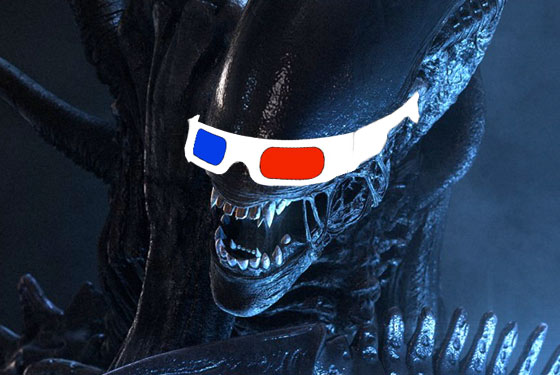
Now we understand why Sir Ridley Scott is so eager to shoot back-to-back Alien prequels in 3D. The Oscar-winning director is in negotiations to form a partnership with Symphony 3D, the parent company of one of the top manufacturers of 3D glasses and projection systems, MasterImage 3D. Scott’s production company is called Scott Free Productions, but he’s calling this new joint venture Scott Three Productions.
It’s easy to see why Scott - who is based at Twentieth Century Fox - is so eager to jump into the 3D business: When the last dollar of Avatar’s many dollars was counted, 83% of the film’s chart-busting gross came from 3D presentations; the number was 67% for How to Train Your Dragon. And while Disney’s Alice in Wonderland was originally shot in 2D, they retroactively converted it, and 3D accounted for 72% of its gross. (Does this mean Scott will go back and add another dimension to his past classics like Alien and Blade Runner? He has pooh-poohed the idea, but if you own a 3D company, why not hire a couple of interns to do it and then watch the money roll in?)
As more and more screens go digital and 3D, Scott is clearly hoping MasterImage 3D will be an appealing alternative to more dominant players, like RealD. Unlike some of its competitors, MasterImage 3D equipment is purchased outright by movie theaters, and does not demand royalties for each ticket sold, as is the case with RealD. Plus, with studios cutting back on the amount of gross they’re willing to share with even all-star directors like Scott, this must be an appealing growth industry for him.
It’s not clear how much Scott, whose net worth was estimated to be $172 million by The Sunday Times of London, is gambling on his 3D venture. But he is one of the most entrepreneurial directors working in Hollywood: His commercial production company, RSA Films, represents elite directors like Kathryn Bigelow (The Hurt Locker), Neill Blomkamp (District 9) and Joe Carnahan (The A-Team) for TV ad work. Scott also once owned Mill Film, a now-defunct London visual effects company that worked on Gladiator and won the visual effects Oscar in 2001, and he currently owns the UK-based Shepperton Studios with his brother, Tony.

